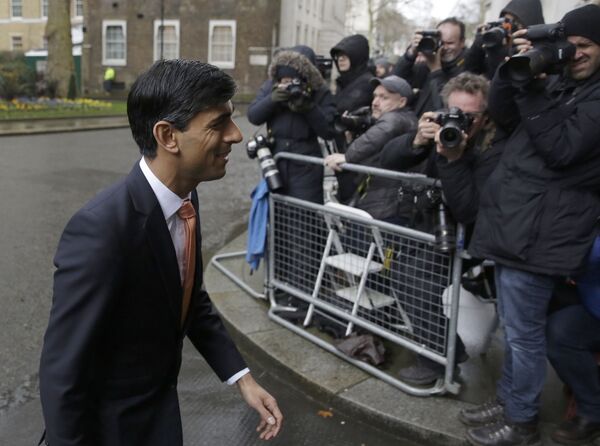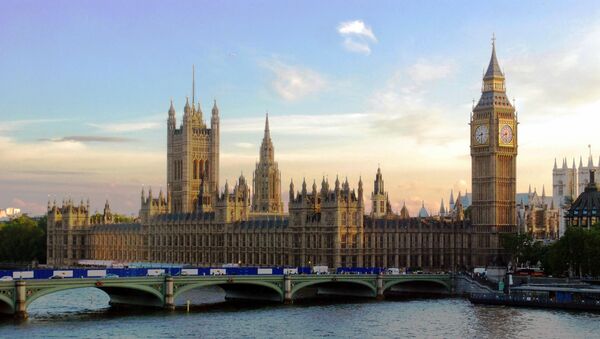The UK Treasury is considering a tax hike up to more than £20 billion ($27 billion) per year in order to pay for the nationwide lockdown that dragged Britain into the biggest economic downturn in 300 years.
According to the Sunday Times, British officials are considering raising the capital gains tax and corporation tax in the November budget, while The Sunday Telegraph also cites cuts to pension tax relief and an increase in fuel and other duties among other measures on the table. The media outlet specifies that some government officials are opposed to the sweeping tax raid and are more inclined to consider spending cuts.
An 'Utterly Unjustified' Measure
The coronavirus pandemic upended economic growth and brought many businesses to a standstill, forcing the government to step up borrowing. As a result, on 21 August, the Office for National Statistics (ONS) admitted that the UK public debt has exceeded 100% of gross domestic product (GDP) for the first time since 1963, breaching £2 trillion ($2.6 trillion).
Under these circumstances the government's intent to resort to a sweeping tax hike may add insult to injury for the nation, which has already been severely hit by the virus, claims Steve Keen, the author of “Debunking Economics” and the world’s first crowdfunded economist.
"It will affect everyone, and badly," Keen warns. "All increasing taxes does is take money out of the economy. You do this when you want to slow down an economy that is overheating. But the economy is currently reeling from the biggest non-financial crisis in history – and one whose effect could be greater than the greatest financial crisis, The Great Depression."
While the economy may already have contracted by around 25%, the potential tax hikes could push demand down by another 1-2%, the author presumes, stressing that the measure is "utterly unjustified" and based on "one of the misconceptions of how money is created".
"When a government runs a deficit, it puts more money into private bank accounts than it takes out of them – thus creating money," the economist explains. "Balancing this money in private bank accounts is an identical sum of Reserves at the banks – which they earn no interest on. If the Treasury issues bonds equal to the deficit, banks will buy these by swapping Reserves for Treasury Bonds – which do earn interest."
"In other words, there is no difficulty in financing a government deficit as the financial sector will "always want to buy Treasury Bonds, no matter how many are issued, because the deficit they finance provides the banking sector with the 'money' (actually, their Reserve accounts at the Central Bank) they use to buy the Bonds," according to Keen.
"They would be foolish not to buy them, because they would be turning down getting interest on bonds when they don't receive interest on Reserves," he remarks.
It appears that the proposed tax hikes "won’t raise much revenue while discouraging investment", echoes Douglas McWilliams, chief executive and founder of Centre for Economics and Business Research (CEBR).
He expresses concerns that the government's measure aimed at taxing businesses and entrepreneurs would exacerbate the situation even further: "Entrepreneurs have been worst hit by the recession while individuals have been largely protected," he opines. "There are times when the rich should pay disproportionately but this isn’t one of them."

Tax Hikes May Alienate Asian Multinational Investors
In addition to the budget deficit problem, the government has to deal with Brexit and the necessity to attract foreign direct investment, now that Britain is economically independent. However, the aforementioned tax hike may bring these bold plans to nought, according to Rajiv Biswas, Asia-Pacific Chief Economist (APAC) at IHS Markit, a London-based British information provider.
While European governments are betting on Asia's steady economic rise, it appears that Asian multinational investors would prefer to invest their money in the EU rather than in the UK, he suggests.
“If the UK raises its corporation tax rate significantly as part of any fiscal consolidation plans, this would be a further negative factor for Asian companies when considering the attractiveness of the UK as a location for foreign direct investment", Biswas elaborates. "Brexit has already reduced the attractiveness of the UK as an investment location for Asian multinationals since the UK is no longer part of the EU single market".
The economist explains that in the post-Brexit landscape "any Asian multinationals in both manufacturing and services sectors are likely to prefer to locate new investment within the EU rather than in the UK, to obtain the benefits of the EU single market".
"Asian companies with subsidiaries established within the EU can export and invest across the EU with very low regulatory barriers, as well as benefiting from the free movement of goods and services within the EU," he emphasises.
Furthermore, in case Britain increases its corporation tax rate in addition to having left the EU, this would "further erode the attractiveness of the UK for foreign direct investment by Asian multinationals", Biswas opines. Asian investors already have a vast number of EU member states to choose from for both manufacturing and services-related new direct investment inflows, so it apparently is not worth the pain to adjust to the UK's changing financial conditions, according to him.
Our latest data show that retail sales increased by an estimated 3.6% in July 2020 and slightly above pre-pandemic levels https://t.co/LtiKCsos8E pic.twitter.com/zE9P32CHCJ
— Office for National Statistics (ONS) (@ONS) August 21, 2020
Meanwhile, the UK economy is slowly rebounding from the protracted COVID crisis: according to the Office for National Statistics (ONS), retail sales in July soared 1.4% above year-ago levels and slightly above pre-pandemic levels. "Growth in the retail sales industry contributes approximately 5.4% to GDP," ONS reported on 21 August. However, not all the UK economic sectors, even in the retail industry, are seeing a V-shape bounce, the statistics entity admits.




